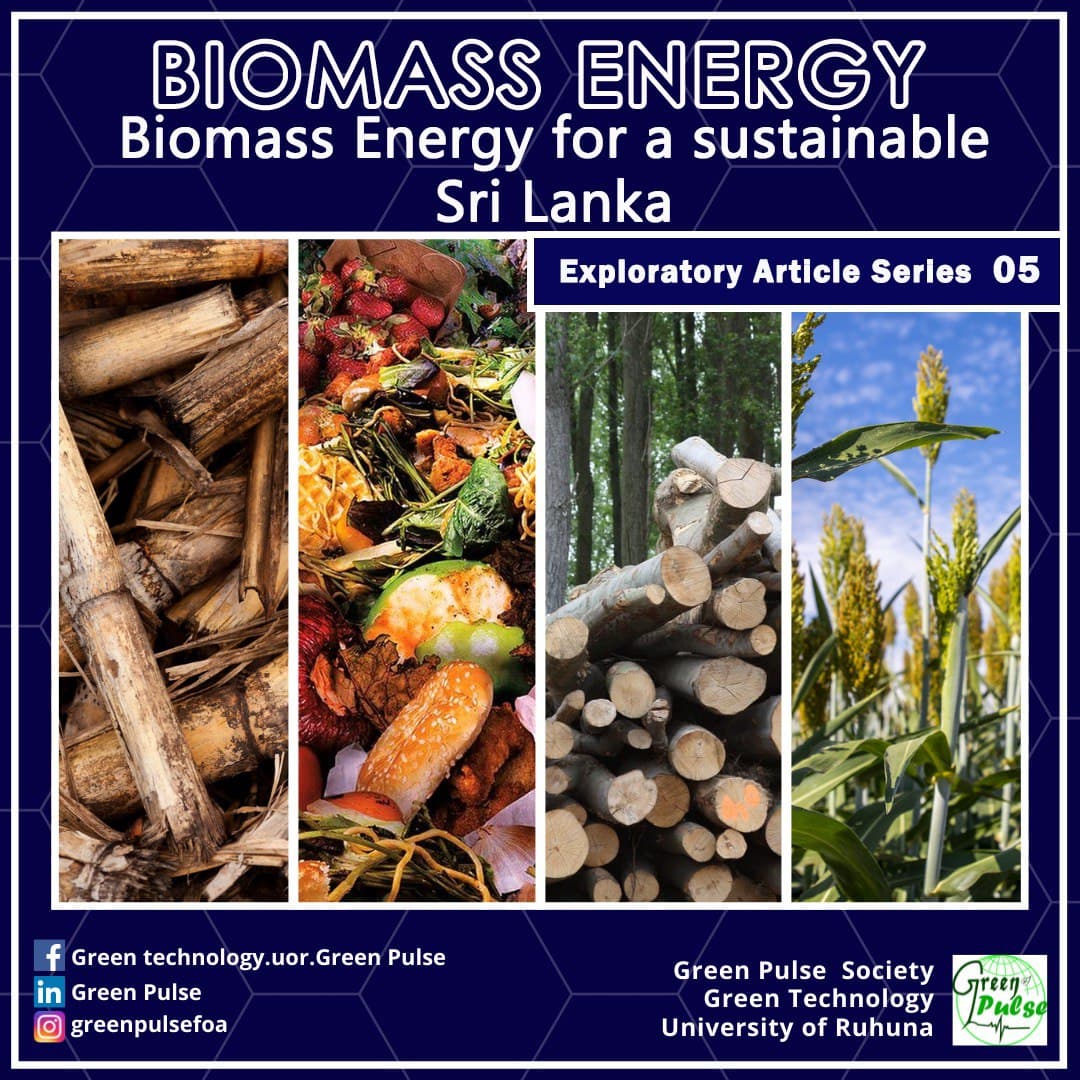Situated on the equator in the tropics, Sri Lanka is a beautiful biodiversity hotspot with a wide variety of flora and fauna throughout the year. Blessed by nature, this abundant flora and fauna throughout the island has met our energy needs from the past to the present as the most readily available biomass, the primary source of energy.
Let us first identify what biomass is.
Biomass is the organic matter in which sunlight is stored as chemical energy. Simply put, they are any plant and animal remains and waste that can be used to generate energy. As biomass in Sri Lanka we have forest residues (firewood), agricultural residues (dahiya, straw, sugarcane) and animal wastes, domestic biodegradable waste (kitchen wastes, wood wastes). Waste from industries such as paper can be used.
The energy generated by biomass is mostly used for power generation and thermal energy. The use of biomass is much cheaper than the use of fossil fuels, especially in Sri Lanka, where there is a growing demand for thermal energy for domestic as well as traditional industries.
There are currently several biomass power plants established throughout Sri Lanka which can be classified as dendro power plants and agricultural and industrial waste power plants. Dendro power plants use timber for power generation and sustainable fuel cultivation. The energy contained in the biomass in these power plants can be converted into usable energy by the five methods of combustion, gasification, pyrolysis, digestion and fermentation.
In addition to domestic consumption, traditional industries such as the brick and tile industry, the bakery industry, and the tea and rubber processing industry are directly dependent on biomass energy. In particular, biomass combustion system technology, which is widely used in traditional industries and at home, is widely used and operates efficiently, capturing 65% - 90% of the energy stored in fuels in general. (Efficiency varies with the amount of moisture contained in the fuel.)
Currently, studies are being conducted on the efficient use of biomass in Sri Lanka, and these studies are being conducted to determine the most suitable plant species suitable for fuel forestry, their nutrient requirements and their ability to withstand disease and adverse climatic conditions, which are highly adapted to the climate and soil composition of Sri Lanka. Is done.
The use of biomass has many benefits for a developing country like ours. Primarily, 39% of our energy demand is met by non-renewable sources such as crude oil and coal. But, by popularizing biomass, which is readily available in our environment as a fuel, it would be a more advantageous solution to be able to save the foreign exchange that flows abroad in this way. At the same time, we can create a more sustainable and energy-secure future instead of relying on other countries for energy.
Of particular note is the fact that, unlike other power plants, biomass power plants have the potential to produce a reliable base load that will not break.
In addition, bio-fertilizers produced by biomass as a by-product of energy synthesis can be used to fertilize the soil. This is an excellent substitute for chemical fertilizers and also contributes to foreign exchange savings.
Also, the generation of energy from the use of biodegradable waste can provide a sustainable and effective solution to municipal waste and waste management.
The location of biomass power plants is an important factor in its longevity. This is due to the ease of detection and transport of materials used as biomass. Accordingly, rural plains are suitable areas for setting up these power plants. As a result, the entrepreneurship of the rural people living in the area will improve and the standard of living will improve. Accordingly, the development of rural areas through these projects can be considered as an added benefit.
In addition, Glyricidia cultivation as a fuel timber plantation in many parts of Sri Lanka also has many environmental benefits. Primarily, Glyricidia leaves can be used as a very fertile fertilizer. Glyricidia helps to reduce soil erosion and improve environmental factors by contributing to soil restoration and soil moisture conservation.
When viewed from a variety of perspectives, it is clear that biomass energy contributes immensely to the future economic development and energy security of Sri Lanka.
Everything in the world has a positive as well as a negative side.
Although used as a biomass, it can sometimes adversely affect the survival of endemic and endangered valuable plant species. That is, the threat to biodiversity.
Biomass is most commonly used in wood stoves for thermal energy used in the home. Many of these wood stoves are inefficient and unhygienic, leading to indoor air pollution and many other diseases. Exhaust fumes and ash, especially from incomplete combustion of fuel, can cause respiratory problems and even cancer. Therefore, the promotion of efficient oven use has become essential for the healthy survival of the community.
Before stopping at another stop in the search for renewables, let's make a note of this. We talked about solar, water, wind, and biomass as renewable energy. By now Sri Lanka has been identified. Stay tuned with Green Hearts Our next stop is exploring geothermal energy.
#green #greentechnology #universityofruhuna #uor #sdg #sustainable #technology #knowledge #greenfuels #alternativeenergysources #greenhousegases #biomasstechnology #environment








0 Comments